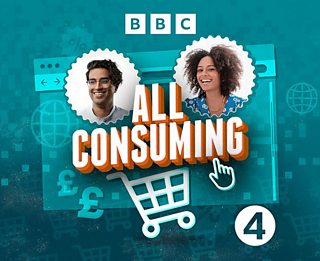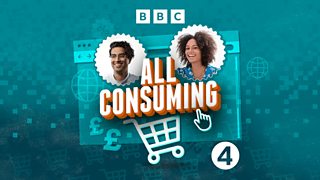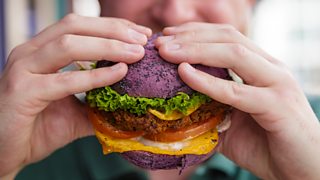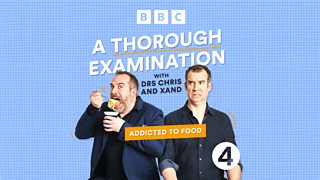Just how healthy are plant-based meat alternatives?
In recent years our supermarket shelves have undergone a transformation. Sections once devoted solely to meat and animal products are now brimming with plant-based alternatives: from spins on classics like tofu and seitan, to modern products like mycoprotein-based Quorn and lab-designed vegan burgers.
For the Βι¶ΉΤΌΕΔ Radio 4 series All Consuming, Charlotte Williams discovers that there is nothing new about plant-based food. She talks to experts – ranging from a vegan-accredited farmer to a YouTube superstar chef – to find out just how good these modern processed vegan, plant-based products are for us, and the planet.
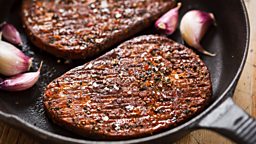
Plant-based meat alternatives date back thousands of years
Interest in plant-based diets has been exploding in the UK in recent years. According to Statista, retail sales of vegetarian and plant-based products amounted to approximately £885 million in 2017. By 2020 that nearly doubled to £1.5 billion.
But despite the swift rise of plant-based animal alternative products on our supermarket shelves, there's nothing new about plant-based food. For millennia, people have been creating products derived from vegetables.
Soy milk, common in our supermarkets and coffee shops, has been produced for more than 2,000 years, beginning in the Han dynasty in China. Soon after came the famous tofu, made by curdling soy milk to produce a solid source of protein. Another modern-day plant-based meat alternative, seitan (wheat gluten), is also a Chinese invention, dating from the 6th Century.
Scientifically-formulated meat replacements are leading the charge
Fast forward to 1985 and British brand Quorn hit the UK market with its mycoprotein-based alternative meat products, created by fermenting fungal spores in a process similar to brewing beer.
But it's been the new wave of American venture capital-backed, scientifically-formulated meat replacements that has been the vanguard of the modern plant-based food revolution. Beyond Meat and Impossible Foods captured the zeitgeist with their eponymous burgers launched in the mid-2010s, and are now billion-dollar companies.
These plant-based products are driving a new era of accessibility for vegan diets, says Gaz Oakley, the chef and YouTuber from Wales whose popularity exploded after he posted a vegan fish and chips recipe five years ago. (He now has a total subscriber base of more than 2 million users.) "I feel like it's made things way more convenient for people," he says.
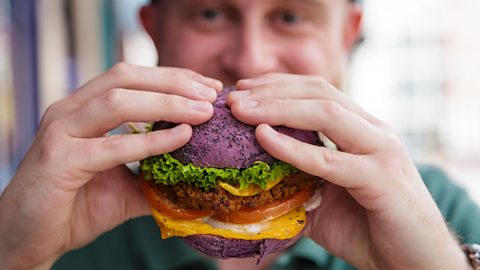
Are plant-based meats really that much better for the planet?
Dr Chris Bryant tells Charlotte about the benefits.
Plant-based meat alternatives have a range of health benefits
These plant-based alternatives to meat are renowned for being healthy. But Gaz questions how good for us these meat alternatives really are. "As someone who went vegan initially for the health benefits, I wasn't really reaching for those fake sausages or meats. I want my food to be as little processed as possible," says the YouTube star. "I'm not sure how healthy these products are. But they’re not designed to be eaten everyday anyway."
We intuitively believe that processed foods are unhealthy and many of us will avoid these plant-based products for that reason.Dr Chris Bryant
These biases around processed foods will lead us astray, claims Dr Chris Bryant, a researcher of meat alternatives at the University of Bath Department of Psychology. We intuitively believe that processed foods are unhealthy and many of us will avoid these plant-based products for that reason. But research suggests they have numerous health benefits over their conventional meat counterparts.
"Not only do they tend to be lower in fat, including saturated fat and trans-fat, they're also lower in energy density, meaning a lower amount of calories for the same quantity of food," states Dr Bryant. "They also have higher amounts of fibre and other vitamins and minerals which benefit people. And they're lower in cholesterol."
And many developments are still taking place, he says, that will make these products even better for us in years to come: "We do things like adding microalgae or different types of bacteria to these foods to increase their vitamin content. We can treat them with enzymes or fermentation to reduce the content of phytic acid."
Plant-based alternatives could be the long-term sustainable option
When former dairy farmer Laurence Candy lost around 75% of his dairy herd to TB, he shifted the trajectory of his business. It’s now a 'veganic' farm, certified to the Biocyclic Vegan Standard – the first of its kind in the UK.
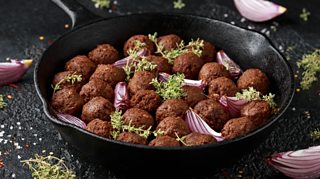
Laurence says it's crucial that we rethink our approach to food production: "Global agriculture is responsible for about 24% or 15 gigatons of CO2 equivalent. Plant-based agriculture is approximately five gigatons, or one third, and animal agriculture globally is responsible for 10 gigatons, which is two thirds. So, when we look to reduce the carbon footprint of global agriculture, obviously it’s animal agriculture which is the chief emitter of greenhouse gases, hence the reason for scientists to advocate a plant-based food diet."
Dr Bryant's research endorses this argument. "On the sustainability side we find very decisive findings in favour of plant-based animal product alternatives," he says. "One study that looks at the greenhouse gas emissions associated with plant-based burgers found they were 96 to 98% less than for beef burgers."
"Plant-based animal product alternatives really are orders of magnitude lower when it comes to environmental footprint compared to animal products."
Are plant-based alternatives a sustainable fast-food option?
Chef, food writer and entrepreneur Thomasina Miers says that "to have sustainable diets we all need to eat less meat". If consumers still want their 'dirty burger' then plant-based alternatives provide a great, more sustainable option for a fast-food fix.
However, like Gaz, she favours cooking her veggie meals from scratch and would be worried if these processed products were the only foods available. "I'd be saying, where are the nutrients coming from? Where are the phytochemicals? Where are the vitamins and minerals?"
Is 'vegan' a dirty word?
Gaz admits that he's made a conscious decision to distance himself from the vegan label, because of the extreme response it seems to elicit on social media. With his original YouTube handle, @avantgardevegan, he experienced a lot of 'hate' coming his way. Today, as the rebranded @chefgazoakley, he says, "people are just like, 'Oh wow, this is really nice-looking food.'"
According to Statista, 26% of Generation Z don't eat meat.
He says he does understand the aversion to the vegan label. "I feel like the word is not necessarily a dirty word but it has become divisive," he says. There are extremists within the vegan movement doing off-putting things who are often the people who shout the loudest.
"I don't want to be part of that," he says. "One thing I've always tried to do is to try to make plant-based food and veganism just normal. I want it to be a normal thing."
Dr Chris Bryant believes that if we want people to eat healthy, plant-based alternatives then we need to think carefully about how we label the products. "Some consumers are put off by vegan or vegetarian labels," he says. "They interpret it as exclusively for vegans, rather than for everyone."
One survey looked at consumers' views of different product labels. At the top of that list were words like 'fresh' while at the bottom were terms like 'diet' and 'fat-free'. Then at the very bottom of that list was 'vegan'. "That was rated as the least appealing of different labels that we could find on food products," says Chris, "so I think there's a good case to be made for being quite cautious about labelling products as vegetarian or vegan."
One thing is for certain, with, according to Statista, 26% of Generation Z not eating meat, it's certain these plant-based products will continue to proliferate in the years to come. Seitan is here to stay.
Find out more about Charlotte's adventures in the world of plant-based meats by listening here.
The information contained in this article was correct at the time of broadcast on 29 September, 2022.

More from Βι¶ΉΤΌΕΔ Radio 4
-
![]()
All Consuming: Non-Alcoholic Drinks
Charlotte Williams and Amit Katwala take a shot at the world of non-alcoholic drinks.
-
![]()
Sliced Bread: Wagyu Beef
Greg Foot finds out whether it's marketing sizzle or steak.
-
![]()
Plant Based Promises
Why do we need to eat more plant-based foods? Giles Yeo looks at the alternatives.
-
![]()
A Thorough Examination with Drs Chris and Xand
Chris van Tulleken is on a mission to get his twin, Xand, to quit ultra-processed food.
